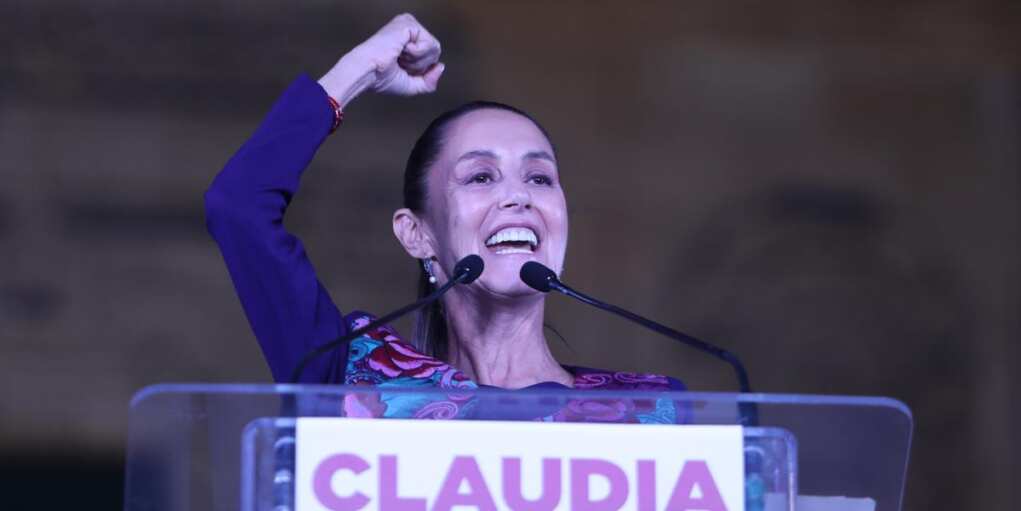Mexican President Says NO To Trump – What Will He Do?

Mexican President Claudia Sheinbaum rejected the idea of U.S. military strikes against cartels on Mexican soil this week after President Trump said he would do whatever it takes to stop drugs from entering America.
Sheinbaum said Mexico would not allow foreign military action in its territory and reaffirmed her government’s position against any U.S. intervention.
Trump said Monday he would consider authorizing U.S. strikes inside Mexico to halt the flow of drugs. He called it okay with him if that’s what it takes to protect American lives. He pointed to what he described as major success intercepting narcotics by sea and suggested similar operations could target cartel routes on land. Trump argued that such action would save millions of lives in the United States.
Sheinbaum pushed back quickly against the proposal.
She said the idea echoed earlier talks with Trump about potential U.S. intervention. The Mexican president said Mexico welcomes cooperation on security but that its sovereignty is nonnegotiable. She stressed that any joint efforts must respect Mexico’s authority within its own borders.
“It’s not going to happen.”
Sheinbaum told reporters that Trump has previously floated U.S. military intervention to combat criminal organizations. She said she told both Trump and Secretary of State Marco Rubio that while Mexico welcomes intelligence sharing, it will not permit foreign forces to operate within its borders.
Sheinbaum said both U.S. leaders appeared to understand her position.
“We operate in our territory.”
The exchange came as officials from both countries worked to clarify reports of a possible U.S. incursion into Mexican territory. On Monday, individuals arrived by boat on a beach in northeastern Mexico and posted signs marking the area as restricted U.S. Department of Defense property.
Mexico’s Foreign Affairs Ministry said the Navy removed the signs after determining they were on Mexican soil.
Sheinbaum said Tuesday that the International Boundary and Water Commission, the agency that defines the U.S. Mexico border, had been called in to review the issue. Witnesses said the signs were posted on Playa Bagdad, near where the Rio Grande flows into the Gulf of America.
The signs said Warning Restricted Area in English and Spanish and claimed the land was controlled by the U.S. military.
Sheinbaum later said the signs were installed by contractors working for a U.S. government agency. She noted that the shifting riverbed often complicates the exact location of the border.
The disputed area is located near SpaceX’s Starbase launch site in Boca Chica, Texas. The facility operates under contracts with both NASA and the Pentagon. In June, Sheinbaum said her government was investigating reports of debris from a SpaceX test explosion that landed on the Mexican side of the border.
The incident also reflects broader tensions between the two countries.
Trump earlier issued a directive to rename the Gulf of Mexico the Gulf of America, a move Mexico has strongly opposed. The name change has become another point of friction in the relationship between the neighboring nations.
The cartel issue has become increasingly urgent as fentanyl and other deadly drugs continue pouring across the southern border into American communities. Trump has made stopping the drug flow a top priority of his administration and has explored various options for disrupting cartel operations.
Mexican cartels control vast territories in Mexico and generate billions of dollars from drug trafficking operations. They use sophisticated smuggling routes and increasingly powerful weapons to maintain their operations and fight rival organizations.
The cartels have grown so powerful that they effectively control large portions of Mexican territory and often outgun local police forces. This has led some American officials to argue that more aggressive action is needed to protect U.S. citizens from the deadly drugs flowing north.
But Mexico has consistently maintained that foreign military intervention on its soil is unacceptable regardless of the security challenges it faces. Mexican officials view any suggestion of U.S. military operations in their country as a violation of sovereignty.
The disagreement highlights the difficulty of addressing the cartel problem when the two countries have different views on how to approach the issue. Trump wants aggressive action to stop drugs from reaching Americans while Mexico insists it must handle security matters within its own borders.
The debate over how to combat cartels will likely continue as both nations struggle to find common ground on addressing the drug crisis that affects millions of people on both sides of the border.

